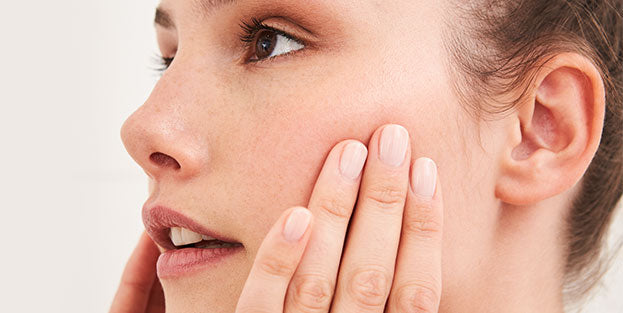We all want to look and feel our best, so when it comes to your complexion, tailoring your skin care ritual to your skin type is key. But how do you know which skin type is yours? The way your skin appears and behaves can tell a lot about what’s going on behind the scenes, particularly when it comes to your overall skin health and well-being.
Read on to learn how to identify and understand your skin type, so you can achieve your skin care goals.
Dry skin
A rough, flaky complexion that feels tight after cleansing is typical for anyone with dry skin. Dry skin can occur with external conditions that disturb your skin’s capacity to retain moisture (like extreme cold or heat), resulting in a thin, patchy surface. However, dry skin can also be a matter of genetics. The biggest issue with dry skin is prolonged dehydration can actually increase your chances of sensitivity and premature ageing.
For dry skin types, boosting hydration during your skin care ritual is essential. When cleansing or exfoliating, choose natural, hydrating formulas that won’t strip your skin’s oil, and opt for rich moisturising creams and serums that deeply hydrate to restore skin health.
blog-4-supporting-img-623x313-v2
Ageing skin
As time goes by, our skin’s appearance and texture changes, affecting firmness, elasticity and moisture. Drier or duller skin than usual, as well as sun damage and the beginning of fine lines, can indicate age-related skin concerns. That said, it’s never too late to slow the ageing process by gracefully combating dryness, dullness and visible signs of ageing. Vigilant sun care and deeply hydrating moisturisers with pure, potent natural ingredients can help protect skin – no matter what your age.
Tip: avoid harsh cleansers or exfoliants as they dehydrate, compounding moisture loss and the potential for sensitivity. Deeply nourishing creams and oils can help rejuvenate moisture and target problem areas like lines and wrinkles, as well as skin tone and firmness.
Sensitive skin
Sensitive skin is easily irritated by external stimulants, evident in the red, blotchy symptoms that follow. You may notice itchiness, visible rashes or hives, swelling, or a tingling, stinging or burning sensation during skin reactions. Sensitive skin is more common in paler tones, the skin surface thinner and more translucent, making sensitive skin extra susceptible to environmental conditions and effects (for example, sunburn and photo-ageing).
As sensitive skin types are prone to drying and irritation, avoid products with ingredients like artificial colours and fragrances. Natural skin care products with botanical extracts such as Calendula can also help soothe red skin and rebalance sensitivity.
Oily skin
Your skin’s sebaceous glands are responsible for the production of skin oil, or sebum. This can be influenced by many things, but the most common factor is hormones (think back to your skin during adolescence). When too much sebum escapes through your pores, a shiny, oily complexion results, with the additional problem of facilitating blemishes. Large, open pores can be an indication of oil production, but visibly smaller pores can also generate oily skin conditions – in the latter case, the culprit is likely to be skin care product-related.
So what can you do? While it’s tempting to look for products that eliminate sebum, harsh ingredients can dehydrate skin – which can actually increase oil production. With oily skin types, cleansing gently but thoroughly, and finishing with a light moisturising lotion to rebalance oiliness, can help keep your skin’s oil production in check.
Normal skin
Normal skin is actually quite unusual, as other skin types are much more prevalent. Normal skin is clear and even, with a well-balanced surface that retains moisture, and minimal breakouts.
Normal skin indicates healthy circulation, although impurities can occur from time to time, depending on individual skin care rituals. The trick for normal skin types is maintenance, so gentle, natural skin care products that focus on balance are best.
The subtle differences between each skin type are a reality for all of us, whether we’re dry, ageing, sensitive, oily or normal. Identifying and understanding your skin type, and what it needs to look and feel its best, is the key to unlocking your skin’s wellness.
What skin type are you, and what tips and tricks have you learned on your journey to skin wellness? Let us know on Facebook.
Want more natural skin tips and tricks? Download the Jurlique Skin Care Challenge
Sign up to the Jurlique newsletter for more on how to care for your skin, naturally.

UNDERSTANDING YOUR SKIN TYPE
by
Tharlya Crompton
in
Wellbeing Journal


